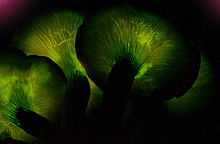Omphalotus olearius
| Omphalotus olearius | |
|---|---|
| | |
| Scientific classification | |
| Kingdom: | Fungi |
| Subkingdom: | Dikarya |
| Phylum: | Basidiomycota |
| Subphylum: | Agaricomycotina |
| Class: | Agaricomycetes |
| Order: | Agaricales |
| Family: | Marasmiaceae |
| Genus: | Omphalotus |
| Species: | O. olearius |
| Binomial name | |
| Omphalotus olearius (DC.) Sing. | |
Omphalotus olearius, commonly known as the jack-o'-lantern mushroom, is a poisonous orange gilled mushroom that to an untrained eye appears similar to some chanterelles. It is notable for its bioluminescent properties. It is found in woodland areas in Europe, where it grows on decaying stumps, buried roots or at the base of hardwood trees. A similar, but phylogenetically distinct[1] species found in eastern North America is Omphalotus illudens.
Unlike the chanterelle, the jack-o'-lantern mushroom contains the toxin illudin S, and is poisonous to humans. While not lethal, consuming this mushroom leads to very severe cramps, vomiting, and diarrhea. Complicating its toxicity is the fact that it smells and looks very appealing.
Description

The jack-o'-lantern mushroom is orange. Its bioluminescence, a blue-green color, can be observed in fresh specimens in low light conditions once the eye becomes dark-adapted. The whole mushroom doesn't glow — only the gills do so. This is due to an enzyme called luciferase, acting upon a compound called luciferin, leading to the emission of light much as fireflies do when glowing.
| Omphalotus olearius | |
|---|---|
|
| |
| gills on hymenium | |
| cap is infundibuliform | |
| hymenium is decurrent | |
| stipe is bare | |
| spore print is yellow | |
| ecology is saprotrophic | |
| edibility: poisonous | |
Similar species
Unlike chanterelles, jack-o'-lantern mushrooms have true, sharp, non-forking gills; this is possibly the simplest trait for distinguishing between the two. Furthermore, if the jack-o'-lantern's stem is peeled, the inside is orange, while the chanterelle is paler inside the stem.
The eastern North American jack-o'-lantern mushroom is Omphalotus illudens; the Western jack-o'-lantern mushroom (Omphalotus olivascens) is common in southern to central California: Both are poisonous. The similarly poisonous mushroom Tsukiyotake (Omphalotus japonicus (Kawam.) Kirchm. & O.K. Mill., also known as Lampteromyces japonicus (Kawam.) Sing.), found in Japan and eastern Asia, is also bioluminescent and contains the same poison, illudin. It was confirmed in 2003 that Tsukiyotake is a relative of the jack-o'-lantern mushroom.
See also
References
- ↑ Kirchmair M, Morandell S, Stolz D, Pöder R, Sturmbauer C. (2004). "Phylogeny of the genus Omphalotus based on nuclear ribosomal DNA-sequences". Mycologia 96 (6): 1253–60. doi:10.2307/3762142. JSTOR 3762142. PMID 21148949. Retrieved 2010-05-26.
External links
| Wikimedia Commons has media related to Omphalotus olearius. |